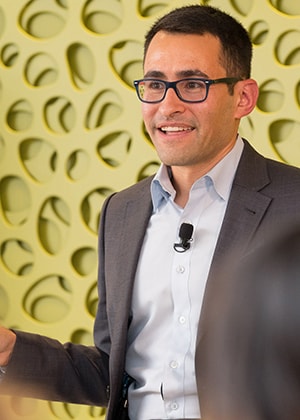The cyborg therapist: How AI and humans working together can help employee mental health
Workers face unprecedented mental health crises, driven by the COVID-19 pandemic and other emergencies—but AI can help restore the balance.
By Mitch Wagner | October 2020

The global workforce is facing a mental health crisis, straining to deal with COVID-19 and related economic and political emergencies. Business is feeling the strain, struggling with a burned-out, stressed-out, and depressed workforce.
But artificial intelligence can be part of the solution.
Those are some of the findings in a recent study by Oracle and Workplace Intelligence, an HR assistance and advisory firm.
On the eve of the release of the research, Oracle Connect talked with Dan Schawbel, Workplace Intelligence founder and managing partner, about burnout, working in isolation, and the rise of the robot therapist.
Oracle: Why are workers unhappy in 2020?
Schawbel: Productivity has skyrocketed over the past six months, but it’s also led to burnout and mental health problems. As a result, our study shows that 70% of the global workforce is suffering.
We looked specifically at factors such as stress and anxiety, which lead to burnout. It’s the stress of feeling like you might not have job security. If you suffer from mental health problems at work, that affects your homelife. The two are more intertwined than ever before, with people working from home. This is especially clear when you’re working six feet from your bed, like I am.
More than 30 million Americans live alone. That number has increased over the years. With no office culture to connect with, workers could potentially feel more lonely and isolated. If you’re suffering, it’s going to be hard to sleep. You end up being so exhausted that it’s hard to produce high-quality work, because you’re just trying to recover from burnout. Everything is connected.
Oracle: How did you arrive at these findings?
Schawbel: The survey data was collected in July 2020, and 100% of all respondents work full-time in HR, IT, sales, marketing, engineering, PR, communications, and more—across multiple industries. We interviewed more than 12,000 people from 11 countries. Some 89% of respondents were working remotely during the pandemic. Hourly workers were not interviewed; had they been included, the results would likely have been even more severe.
“If companies promote mental health programs and invest in employee assistance programs in the workplace—which we’re urging people to do in this report—then they’re helping workers focus.”
What makes this study unique is it’s not just identifying the problem, but it poses technology as a solution to the ongoing mental health epidemic that everyone is experiencing. It shows that if we invest more in technology to streamline the workday, it can make people’s lives easier. We found that AI has helped over half of the workers shorten their workweek and allows them to take longer vacations. We found it improves job satisfaction overall.
Oracle: Is this where robots can help?
Schawbel: Yes, if by “robots” you mean “technological automation.” This is a bit more inclusive than what people traditionally think of as a robot. In any case, they can help automate tasks and decrease workload. And they can help people prioritize tasks and get answers to questions quicker. This all helps prevent burnout.

Dan Schawbel, founder and managing partner, Workplace Intelligence says technology can help automate tasks and decrease workload—helping prevent worker burnout.
Additionally, workers are turning to robots over human beings when it comes to getting advice and support for their mental health. This is a big shift. Part of it is availability: A human is not going to be on the phone with you at 2 a.m. if you’re having trouble sleeping, but a robot is available 24/7.
And robots provide a judgment-free zone. Employees don’t really feel comfortable going to HR, for instance, and saying, “Hey, I’m suffering from burnout.” There is a lack of trust, a fear that they might get laid off or suffer in some way if they ask for help. Human beings are more likely to judge someone else’s situation. But a robot doesn’t see it like that. Employees would rather turn to a robot or an artificial intelligence system for guidance.
If companies promote mental health programs and invest in employee assistance programs in the workplace—which we’re urging people to do in this report—then they’re helping workers focus. Workers will feel like their organization is taking care of them and cares about them. And therefore, they’re more willing to stay with the organization longer, work harder, and recommend their organization to their peers.
Oracle: Is it sad that people would rather talk to a robot than a person?
Schawbel: Technology can be part of the solution, but it’s not the full solution. That’s important.
Therapists won’t magically lose their jobs during the next 10 years. Therapy is going to be a combination of human and machine. And those roles will evolve over the years.
We asked: “What can a robot do to support your mental health better than humans?” And workers said that robots can support their mental health better than humans by providing a judgment-free zone, giving them an unbiased outlet to share their problem, and quickly answering their health questions.
We asked: “What can humans do to support your mental health better than a robot?” The top answers were understand the pressures of my job, interpret my feelings when I don’t know how to explain them, and make me feel safe and secure.
That tells you that humans will handle the emotional high-touch aspects of mental health, and the process and problem-solving aspects will be with machines.
Dig deeper
Photograph: Workplace Intelligence
Illustration: Oracle

Mitch Wagner
Mitch Wagner is a senior writer at Oracle. He was previously executive editor at Light Reading and at InformationWeek. He loves Honeycrisp apples and the original Star Trek.